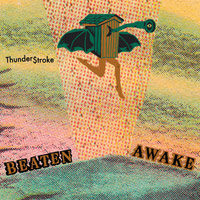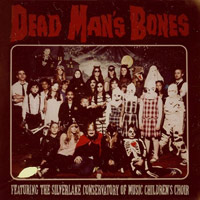
Love Comes Close
Matador
Let’s be honest. The exercise of linking the current crop of synth-pop revisionists to their obvious ’80s building blocks, is becoming tiring and, well, pretty obvious. We live amongst a musical climate where new ideas are as limited as the planet’s oil reserves, and the only mode for survival in the future balances on the practice of recycling energies. So scrawling various mentions to New Order and the Human League in red felt-tip along the margins of Cold Cave’s debut album, Love Comes Close, is fruitless. There’s little doubt in my mind that Philadelphia native Wesley Eisold would neither deny an indelible influence to the former, as the title track here is a note-for-note copy, nor a wanton fancy for the sparkling and plastic romanticism of the latter. He likely bathed in MTV’s glow at a young age, and eventually abandoned it once he became obsessed with torture electronists. The future for this sort of icy disco and chapped wave delusions depends on striving for a better product, one that compacts it all into easily consumable units, giving beauty and grotesque the same face, something Cold Cave manage effortlessly on this record.
Eisold has, for the most part, made a swift and comforting shift into this aesthetic. Prior to Love Comes Close, Cold Cave showed signs of melody and floral nuance, but played their safety dance in a gloom-ravaged junkyard filled with distorted circuitry and monotonous detachment. What was once a game of prying blossoms out from static grey concrete has, in songs like “Heaven Was Full” and “Youth and Lust,” become a puzzling widescreen where the challenge comes in spotting the trio’s frayed edges and subversive technique—the organic substances that set them apart from other modern escapists. Most of that mercurial dark matter is found courtesy of Ian Dominick Fernow of Prurient, who lends a creeping atmosphere even when it sounds like Howard Jones is looking over his shoulder. In Eisold’s brighter, poppier universe, synths fall frivolously like “neon acid rain,” vocals waver in an exaggerated flattery of Peter Murphy or Ian Curtis, and beats come pre-packaged as if just ripped from cellophane. The repetition and the binary code embedded in each song could have become slightly too much, yet Eisold knows when to say when, reeling things in before they stretch over the edge. Love Comes Close is as advertised, awash with parables on nearing death, nearing lust, nearing humanness, but instead finding a perfectly compatible existence inches from reality.
Kevin J. Elliott
MP3: “The Laurels of Erotomania”

Thunder$troke
Fat Possum
The songs of Kent, Ohio’s Beaten Awake have always crossed into two strains depending on who was doing the singing (and songwriting apparently). If Joel McAdams was at the helm, then the band would be taking a Silver Jewish path of reverie, laidback but not as deadpan. With Jon Finley, songs became more grandiose, cloaked in My Morning Jacket expanses but not as overstated. This push-and-pull always worked to their favor, presenting two equally compelling personalities that never seemed diametrically opposed.
And so it is with Thunder$troke, the follow-up to the band’s impressive debut, 2007’s Let’s Get Simplified. On leadoff cut “Mr. Thompson (Can You Dig it?),” Finley leads the band on a slow incline into pop ether. McAdams answers with “Suite Cheetah,” which lopes along briskly on prairie tones as he sings barroom couplets like ”I eased up to eavesdrop.” This dichotomy continues throughout the album in a near constant back-and-forth, with the difference being split on songs like the Finley-led “Gyro Quake;” it recalls “The Plan” by Built to Spill, a middle-ground point of reference. Both sides of the Beaten Awake equation on Thunder$troke are compelling enough on their own, but together make for a persuasively unique combination of Rust Belt grit and divebar pop. While the lion’s share of the songs belong to Finley, all this seems like a moot point now, though, as McAdams apparently exited the band before the record’s release. This fact is disappointing, even while the album certainly is not.
Stephen Slaybaugh

Dead Man’s Bones
Anti
Dogstar, 30 Odd Foot of Grunts, and other celebrity grease-fires posing as rock bands have lowered expectations of actors-turned-musicians to such a degree that their projects are rarely mentioned outside of the celebrity trash-mag circuit. But the last couple years have been unusually fruitful for movie stars who can’t stand the thought of being famous for only one talent. The insufferably adorable Zooey Deschanel received critical praise and a spot on the Billboard Top 100 for her M. Ward collaboration, She and Him. And while reviews for Scarlet Johansson’s Tom Waits cover album were decidedly more mixed, it was still a unique conceit and far more intriguing than the cock-rock and ersatz country music we’ve come to expect from Hollywood royalty. Now, Ryan Gosling (Half Nelson, Lars and the Real Girl) has hooked up with his buddy Zach Shields for Dead Man’s Bones, a fun, catchy and uniquely produced album released just in time for Halloween that captures the ridiculous, yet legitimately terrifying, childhood fear of ghosts, werewolves and monsters under the bed.
Gosling and Shields take a Gothic kitchen-sink approach to the music, surrounding darkly epic keyboard-driven songs with haunted house noises that were created the old-fashioned way (crushing tin-foil for a rainstorm, ripping paper for a thunderclap, etc.) But their most effective musical instrument is the Silverlake Conservatory Children’s Choir. The use of the young singers is much more than mere gimmickry, and by inserting the choir into this creepy context, it instantly evokes the feeling of being an adolescent on Halloween. Songs like the title track and “My Body’s a Zombie for You” bring to mind the apprehensive first-time engagement with the holiday’s perversity, the ritualistic over-consumption of fun-size candy bars, and the sense of quiet distress that comes after watching the outrageously gory Simpsons Treehouse of Horror specials.
For all of the duo’s conceptual brilliance and charming production work, Gosling and Shields still have a long way to go as songwriters. Many of the melodies fade from memory quickly, failing to earn the sense of grandeur and pageantry that Gosling and Shields bring to them. But while none of these songs is on the order of the unholy trinity of Halloween music (“Thriller,” “Monster Mash,” and “Ghostbusters”) it’s nice to know someone’s still serious about soundtracking the real most wonderful time of the year.
David Holmes

Lungs
Universal
Admittedly, it’d be easy to dismiss Florence + the Machine as another dime-a-dozen European-manufactured female-led bands with a slightly kitschy sense of style. The States have been introduced to Amy Winehouse, Lily Allen, Duffy, Adele, etc, but the thing about Florence Welch and her Machine (a.k.a. her backing vocalists and musicians) is that they sound indisputably inspired, and in turn, indubitably inspiring.
Welch’s voice is a fusion of Motown soul, and a melange of equal parts wisdom and tenacity, a la Grace Slick and her elegant yowl. Though it’s difficult to fathom that she’s just 23 years of age, there’s still an undeniable youthful quality to Florence’s music, though at times it’s difficult to tell whether this comes from lack of experience or a naturally playful disposition. Regardless of Welch’s motives, Lungs is an album that remains solid through and through, boasting a wide array of expertly crafted songs for the picking, with influences spanning from disco and soul to rock and dream-pop.
The production of the album is glossy, much like any major label, and the expert mastering makes it easy on the ears. However, Welch manages to make this album her own and, with her voice, seems to remain in complete control of her destiny throughout. “Howl” is a lyrically solid and vocally haunting pop anthem that manages to avoid the cliches and pitfalls of many such formulas, with strings providing a nice contrast to the disco beats booming in the background. Even the somewhat predictable lyrics of “Kiss With a Fist” sound almost original thanks to Welch’s beautifully crude vocals. Though Lungs may not be the most innovative of albums, originality does not always a quality album beget, and this is one of those instances where raw talent without the exclusionary quality of novelty should be greatly appreciated and thoroughly enjoyed.
Jennifer Farmer

I Told You I Was Freaky
Sub Pop
If you haven’t heard of New Zealand’s Flight of the Conchords or been sent a YouTube clip by a friend who’s a fan of the TV show—then maybe you don’t know anyone with HBO. Or the Internet. Or, possibly, a sense of humor. (In any case, you should expand your social circle to include HBO subscribers, then shamelessly invite yourself over for TV nights.) Since 2007, the show has documented the fictional mishaps of Jemaine Clement and Bret McKenzie, and the quirkily loveable pair has created a comedy arsenal of songs that in the past have included everything from a David Bowie parody to a post-robot revolution ode complete with binary solo. The follow-up is a collection of songs from the second season of the show, delivering witty lyrics and a range of catchy tunes from a new series of oddball misadventures.
Though many of the MP3s were available for sale the day after they aired, a few previously unavailable tracks appear on the album. The title track is this album’s “Business Time,” a faux-sexy song with extremely unsexy situations: “Here I am all dressed in snakeskin. Now I’m in your kitchen making love to your cake tin. Oh, no, is this the one you bake in?” From an episode in which the pair decides that copious amounts of hair gel will make them cooler, there’s the synth-heavy “Fashion Is Danger,” which name-checks President Reagan, Margaret Thatcher and jazzercise. Listeners will learn that a rapper, like anyone else, feels dejected when no one compliments his casseroles and profiteroles in “Hurt Feelings.” A love song, “Carol Brown,” in which Clement sings of all the women who have left him (“Fran ran. Bruce turned out to be a man. Flo had to go, I couldn’t go with the flow”) is interrupted by a chorus of exes listing his faults. “Oh, who organized all of my ex-girlfriends into a choir and got them to sing?” he laments.
Purportedly inspired by a Canadian nightclub employee who split up the Conchords and a group of male friends with this explanation, “Too Many Dicks (On the Dance Floor)” is about just that, against a dance beat: “Too many men, too many boys, too many misters and not enough sisters.” Naturally, some songs aren’t quite as funny without the visuals, such as the “Roxanne”-inspired “You Don’t Have to Be a Prostitute” sans Clement forlornly cruising the streets in his short-shorts, or “We’re Both in Love with a Sexy Lady” out of the context of the show. Flight of the Conchords prove again that they’re a talented combination with no end to imagining the absurd. But then again, they told you they were freaky.
Josie Rubio
MP3: “Sugalumps”
ALBUM REVIEWS
The Slits, Trapped Animal
Little Girls, Concepts
Fuck Buttons, Tarot Sport
Themselves, CrownsDown
Lightning Bolt, Earthly Delights
Air, Love 2
Antipop Consortium, Fluorescent Black
Neon Indian, Psychic Chasms
Bell Horses, This Loves Last Time
Exene Cervenka, Somewhere Gone
Thomas Function, In the Valley of Sickness
Volcano Choir, Unmap
The Black Heart Procession, Six
Basement Jaxx, Scars
